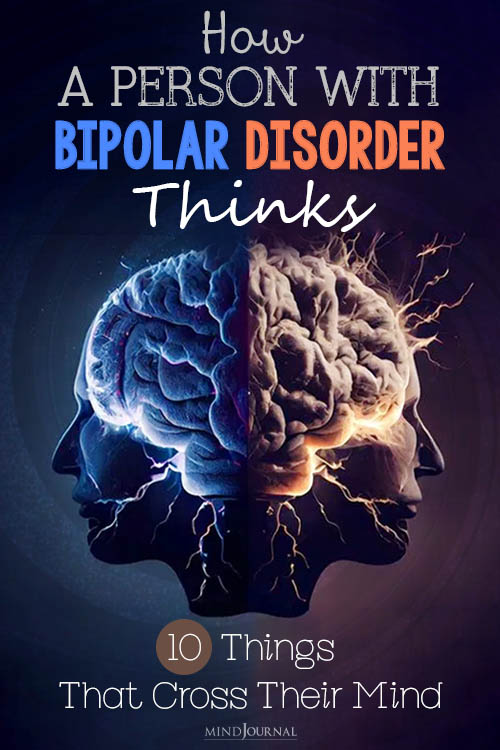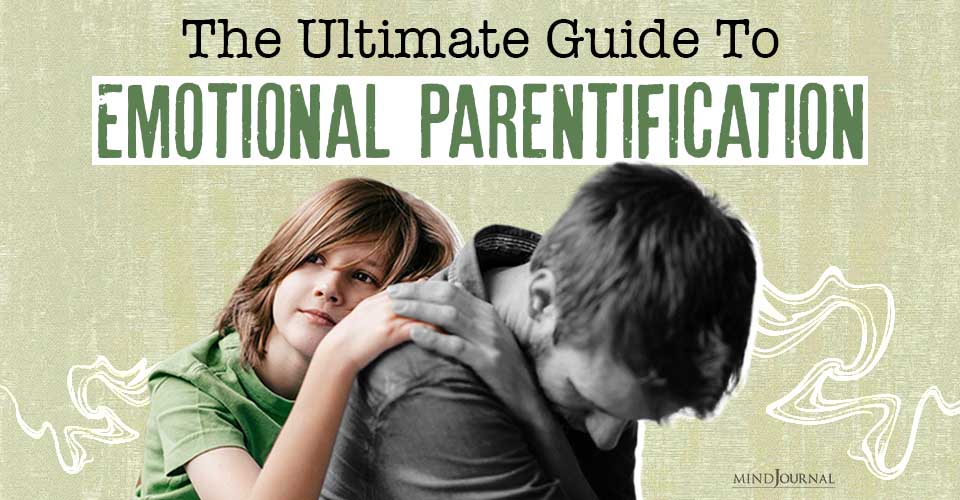Ever wondered how a person with bipolar disorder thinks? Living with bipolar disorder is often a constant ride of highs and lows, not just in mood but also in thoughts.
One moment, someone might feel invincible, brimming with ideas and energy; the next, they may feel crushed by sadness or anxiety, weighed down by self-doubt and exhaustion.
Understanding how a person with bipolar disorder thinks can help you understand better what they might be going through. Today, we’ll dive into what is bipolar disorder, followed by 10 thoughts that often cross the minds of those who live with it.
Let’s start with what is bipolar disorder.
Related: Managing Bipolar Disorder: 2 Psychology Backed Methods For Effective Treatment
What is Bipolar Disorder?
Bipolar disorder is a mental health condition that causes extreme mood swings, including emotional highs (mania or hypomania) and lows (depression). During manic episodes, a person might feel euphoric, energized, or even reckless.
In depressive episodes, they may feel sad, hopeless, and lose interest in things they used to enjoy. These mood swings can be unpredictable, making it challenging to maintain relationships, work, or even daily routines.
Though bipolar disorder is manageable with treatment, it affects how a person perceives themselves and the world around them, often leading to a complex thought process that others might not easily understand.

Now that we know what is bipolar disorder, let’s talk about how a person with bipolar disorder thinks.
How a Person with Bipolar Disorder Thinks: 10 Things That Cross Their Mind
1. “Am I going too fast for everyone else?”
During manic phases, thoughts can race at lightning speed, making a person with bipolar disorder feel incredibly productive or creative but also out of sync with those around them.
They may find themselves jumping from idea to idea, finishing projects, or starting multiple tasks simultaneously, often unable to slow down. This rapid pace can create tension, especially in conversations or work settings, where others might find it challenging to keep up.
For those with bipolar disorder, this thought reflects a mix of excitement and worry about whether their intense pace is alienating others or becoming overwhelming for themselves.
2. “Is this happiness real, or is it just my bipolar acting up?”
How a person with bipolar disorder thinks? Emotions can feel distorted or amplified, making it hard to tell if their happiness is a genuine response to something good or if it’s a symptom of mania.
This doubt can lead to self-questioning, as the person may feel unable to trust their own emotional reactions. Even a genuinely joyful experience can trigger a cycle of “Is this real?” which complicates how they feel about their own joy.
This doubt shows the constant need for self-assessment, where simple emotions require validation and caution to prevent potential manic symptoms from spiraling.
3. “Will this low ever end?”
Depressive episodes often bring a profound sense of hopelessness. During these times, a person with bipolar disorder may feel as if they’re trapped in a fog of sadness and lethargy that seems endless.
Even if they logically know that the feeling will eventually pass, the intensity of the moment can make it seem permanent. This thought captures the depth of despair that can accompany bipolar depression, where even daily tasks feel overwhelming, and the light at the end of the tunnel feels nonexistent.
It’s a reflection of the exhaustion that comes from battling emotional lows over and over.
Related: Causes Of Mental Health Issues: 6 Common Risk Factors, According To Science
4. “Why can’t I just be ‘normal’ like everyone else?”
Comparing oneself to others is common, but for someone with bipolar disorder, it often comes with a sense of frustration and sadness. They might see friends or family members navigating life with more consistency and wonder why their own experience feels so chaotic.
This thought reflects a longing for stability and a desire to be free from the rollercoaster of moods that define their life.
The feeling of being “different” can create a sense of isolation, as they may feel like their condition prevents them from experiencing the same peace and stability that others seem to enjoy.
5. “Will people still like me if they knew what’s going on in my head?”
Living with bipolar disorder can lead to fears of rejection and isolation. They may worry that if loved ones or friends fully understood the depth of their emotional struggles, they’d be judged or abandoned.
This thought reflects the stigma that many people with mental health issues face, as well as the internalized shame they might feel about their condition.
The fear of losing people due to their mental state often forces them to keep their thoughts and feelings private, which can intensify feelings of loneliness and make it even harder to seek the support they truly need.
6. “Am I making a big deal out of nothing?”
Bipolar disorder can blur the line between valid concerns and emotional exaggeration. This question comes from the constant self-doubt that accompanies the disorder, where they wonder if their reactions are justifiable or simply influenced by their mood state.
They may replay situations in their head, questioning if they’re blowing things out of proportion or if their concerns are valid. This self-questioning can be exhausting, as it forces them to scrutinize their own feelings and decisions constantly.
It reflects the challenge of distinguishing between normal reactions and ones influenced by their bipolar condition.
7. “Will I ever be able to trust my own thoughts?”
The unpredictability of bipolar disorder can make people feel like their mind is both a friend and an enemy. They may find it hard to trust their thoughts, especially if they’ve made impulsive or regrettable decisions in the past due to manic episodes.
This question reflects a deep frustration with the sense of not fully controlling their mental state. Over time, this can lead to a lack of self-confidence and hesitation in decision-making, as they second-guess even simple thoughts and ideas.
It’s a painful reality for many with bipolar disorder, as they struggle to find solid ground.
Related: How To Deal With Mood Swings Like A Pro
8. “Why am I so drained all the time?”
Bipolar disorder doesn’t just affect moods; it drains energy, too. A person with bipolar disorder often feel physically and mentally exhausted, even when they haven’t done anything particularly strenuous.
During depressive episodes, just getting out of bed or completing basic tasks can feel like climbing a mountain. This fatigue is a constant reminder of the disorder’s impact, making it difficult for them to keep up with life’s demands.
This thought represents the chronic weariness that many with bipolar disorder face and the frustration of wanting to do more but feeling held back by their body and mind.
9. “Am I going to lose control again?”
How a person with bipolar disorder thinks? Bipolar disorder’s unpredictability can make people feel like they’re always on the edge of another episode. Even during stable periods, there’s often a lingering fear that a sudden shift in mood could cause them to act impulsively or in ways they’ll later regret.
This thought highlights the anxiety of losing control, especially if previous manic episodes have led to poor choices or strained relationships. It reflects a desire for stability and the fear of unintentionally jeopardizing it.
How a person with bipolar disorder thinks? Living with bipolar disorder means grappling with the tension between stability and the ever-present risk of emotional upheaval.
10. “What if I just can’t handle life?”
At its most challenging, a person with bipolar disorder can make daily life feel insurmountable. This question arises from the overwhelming impact of both manic and depressive episodes on work, relationships, and self-care.
The constant shifts can create a sense of helplessness and lead to thoughts of self-doubt. It’s a reflection of the struggle to keep going despite the emotional rollercoaster and the frustration of feeling like life is slipping out of their control.
This thought isn’t a lack of resilience but rather an honest reaction to the intense, ongoing demands of managing bipolar disorder.
Takeaway
Understanding these common thoughts is a step toward empathy and support for those with bipolar disorder.
Each thought represents a glimpse into the complex world they navigate daily, showing the blend of resilience, self-reflection, and vulnerability involved.
Related: 10 Ways To Enhance Your Mental Health
Although bipolar disorder can bring intense highs and lows, with the right support, those living with it can work toward a balanced and fulfilling life.











Leave a Reply